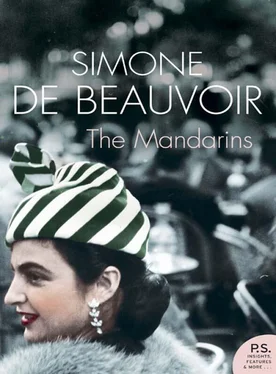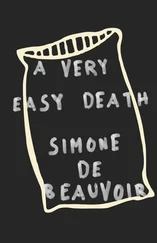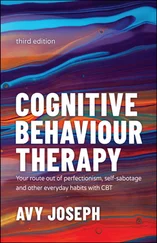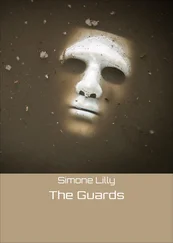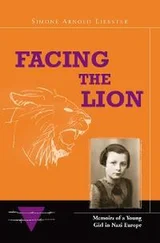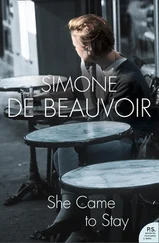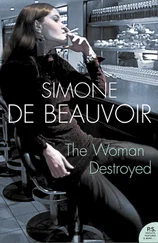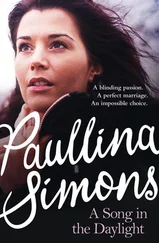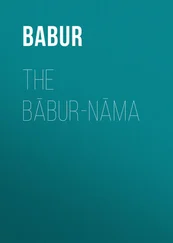‘Oh, I suppose that’s more than likely,’ Robert said. ‘But the opposite view can’t be rejected out of hand.’ He sat down next to me in the chair. ‘It’s not really as horrible as you might think,’ he added cheerfully. ‘Literature is created for men and not men for literature.’
‘It would be sad for you,’ I said. ‘You wouldn’t be happy if you stopped writing.’
‘I don’t know,’ Robert replied with a grin. ‘I have no imagination.’
But he has. I remember how worried he was the night he said to me, ‘My major works are still ahead of me!’ He’s determined that those works shall have weight, permanence. It’s useless for him to protest; above all else he’s a writer. At first perhaps he had dreamed only of serving the revolution; literature was just a means. But it soon became an end; he loved it for itself and all his books prove it, especially those memoirs he doesn’t want published. He wrote them purely for the pleasure of writing. No, the truth is that he simply doesn’t want to talk about himself, and that reluctance isn’t a good sign.
‘As for me,’ I said, ‘I have plenty of imagination.’
The walls were spinning, but I was thinking very lucidly, much more lucidly than I do in the morning before breakfast. In the morning before eating, you’re on the defensive, you manage somehow not to know things you really do know. Suddenly I saw everything with perfect clarity. The war was ending and a new history in which nothing was guaranteed was beginning. And Robert’s future wasn’t guaranteed; it was perfectly possible for him to stop writing and even for all his published works to be swallowed up into nothingness.
‘What do you really think?’ I asked. ‘Do you think things will turn out good or bad?’
Robert began to laugh. ‘I’m not a prophet! But one thing is certain,’ he added. ‘We’re holding a lot of trumps.’
‘But what are the chances of winning?’
‘Shall I look into my crystal ball? Or would you like me to read your tea leaves?’
‘You don’t have to make fun of me,’ I said. ‘I have a right to ask a few questions from time to time.’
‘I ask myself a few, too, you know,’ Robert said.
Yes, he does ask himself questions, and graver ones than I do. Personally, I rarely act on my beliefs; that’s why I so easily become unhappy. I realize I’m wrong being that way, but with Robert it costs so little to be wrong.
‘But you only ask yourself those questions you’re able to answer,’ I said.
He laughed again. ‘Preferably, yes. The others don’t serve much purpose.’
‘That’s no reason not to ask them,’ I said. My voice was rising, but I wasn’t angry with Robert. I was angry with myself, with my blindness during these past weeks. ‘I’d still like to have some idea of what’s going to happen to us,’ I persisted.
‘Don’t you think it’s rather late?’ Robert asked. ‘We’ve both had a lot of punch to drink, and our minds will be a lot clearer tomorrow morning.’
Tomorrow morning the walls will stop spinning, the furniture and books will be in their proper places, always the same places. And my ideas, too, will fall back into place, and I’ll begin to live again from day to day, without turning my head, looking just so far and no farther into the future. I’ll stop paying attention to that discordant clatter in my heart. I’m tired of that diet. I looked at the cushion by the fireplace on which Diego used to sit. ‘A Nazi victory doesn’t enter into my plans,’ he had said. And then they had killed him.
‘Ideas are always too definite!’ I said. ‘The war is won. There’s a definite idea for you. Well, in my opinion we went to a very peculiar party tonight, with all the dead who weren’t there.’
‘There’s quite a difference between saying that their deaths served some purpose and none at all,’ Robert said.
‘Diego’s served no purpose at all,’ I retorted. ‘And what if it had?’ I added irritably. ‘It’s fine for the living, this system by which everything leads to something else. But the dead stay dead and we’re constantly betraying them; they don’t lead to anything.’
‘We don’t betray them by choice,’ Robert protested.
‘We betray them when we forget them and when we use them,’ I said. ‘Regret has to be useless or else it’s not really regret.’
Robert thought for a moment and then, with a perplexed look on his face, said, ‘I suppose I’ve no great talent for regretting. I don’t bother myself much with questions I can’t answer, things I can’t change.’ He paused a moment and added, ‘I don’t say I’m right about that.’
‘And I don’t say you’re wrong. In any case, the dead are dead and we go on living. All the regretting in the world won’t change that.’
Robert took my hand. ‘Don’t go looking for things to make you remorseful,’ he said. ‘We’ll also die, you know; that brings us very close to them, doesn’t it?’
I withdrew my hand; at that moment I was the enemy of all friendly feelings. I didn’t want to be consoled, not yet.
‘Your damned punch has really gone to my head,’ I said. ‘I’m going to bed.’
‘Yes, go to bed now. And tomorrow we’ll ask each other all the questions you want, even those that serve no purpose,’ Robert said.
‘And you? Aren’t you coming to bed?’
‘No, I think I’ll have a shower and do some work.’
‘There’s no doubt Robert is better armed than I against regrets,’ I thought, getting into bed. He works, acts; the future is more real to him than the past. And he writes. All the things that fall outside his normal course of life – misfortune, defeat, death – he puts into his books and considers himself rid of them. But I have no recourse; whatever I lose I can never regain, and there’s nothing to redeem my infidelities. Suddenly I began to weep. ‘These are my eyes that are weeping,’ I thought. ‘He sees everything, but not through my eyes.’ I was weeping, and for the first time in twenty years I was alone, alone with my remorse, my fear. I fell asleep and dreamed I was dead. I woke up with a start, and the fear was still there. And death continues to prowl silently in the room. I switch on the lights, turn them off; if Robert sees the ray of light under my door, he’ll worry. It’s useless; tonight he can’t help me. When I wanted to talk to him about himself, he evaded my questions. He knows he’s in danger; I’m afraid for him. Up to now I’ve always had the fullest confidence in him; I’ve never tried to measure him. For me the measure of all things was Robert. I’ve lived with him as I’ve lived with myself, no distance separating us. But, suddenly, I’ve lost all confidence – in everything. No fixed stars, no milestones. Robert is a man, a fallible, vulnerable man of sixty whom the past no longer protects and the future menaces. I lean back against the pillow, my eyes wide open. To see him better I’ve got to step backwards, far enough back to blot out the view of those twenty years of unquestioning love I’d given him.
It’s not easy. There was a time I did see him from a distance, but I was too young. I looked at him from too far off. Friends had pointed him out to me at the Sorbonne; they spoke of him a great deal, with a mixture of admiration and disapproval. It was whispered that he drank and frequented brothels. If that had been true, I think it would have attracted rather than repelled me; I was still rebelling against my pious childhood. In my mind, sin was a touching manifestation of the absence of God, and if someone had told me that Dubreuilh raped little girls I’d have taken him for a saint of sorts. But his vices were minor and his too-well-established fame irritated me. When I began taking his courses, I had already made up my mind that the ‘great man’ was a charlatan. Of course, he was different from all the other professors. He would come rushing into the room like a gust of wind; he was always four or five minutes late. He would survey us for a moment with his large, crafty eyes, and then he would begin speaking in either a very amiable or a very aggressive voice. There was something provocative in his surly face, his violent voice, his bursts of laughter which sometimes seemed to us a little insane. He wore very white shirts, his hands were always carefully manicured, and he was impeccably shaven; it was impossible, therefore, to attribute to negligence his zipper jackets, his pullovers, his clumsy shoes. He preferred comfort to decency with such an obvious lack of restraint that I thought it affected. I had read his novels and didn’t like them at all; I expected them to bring to me some inspiring message, and all they ever spoke to me of were indifferent people, frivolous sentiments, and a lot of other things that didn’t seem to me the least bit essential. As for his courses, they were interesting all right, but he never really said anything worthy of a genius. And he was always so cocksure of being right that I had an irresistible desire to contradict him. Oh, I was convinced, too, that the truth was to the left; ever since my childhood I had sniffed an odour of stupidity and lies in bourgeois thinking, a very foul-smelling odour. And then I had learned from the Gospel that all men are equal, are brothers; that’s one thing I continue to believe in with an unshakable faith. But spiritually, after I had been for so long crammed full of absolutes, the void left in the heavens made a mockery of all morality I had been taught. But Dubreuilh believed there could be salvation here on earth. I let him know where I stood in my first essay. ‘Revolution, fine,’ I said, ‘but what then?’ When he gave me back my paper a week later as we were leaving the classroom, he ridiculed my efforts. According to him, my absolute was the abstract dream of a petty bourgeoise incapable of facing reality. Of course I couldn’t hold my own against him, and he won every round. But that didn’t prove anything, and I told him as much. We resumed our discussion the following week and this time he tried to convince me, rather than overwhelm me. I had to admit that in private discussion he didn’t at all seem to feel that he was a great man. He began chatting with me, rather often after classes, sometimes he walked home with me occasionally taking a longer route than was necessary. And then we began going out together in the afternoons, the evenings. We stopped talking about morality and politics and other lofty subjects. He told me about the people he knew and the things he did, and most of all he would take me for walks, show me streets, squares, quays, canals, cemeteries, suburbs, warehouses, vacant sites, little cafés, and a hundred corners of Paris that were completely new to me. And I began to realize that I had never really seen things I believed I had always known; with him everything took on a thousand meanings – faces, voices, people’s clothing, a tree poster, a neon sign, no matter what. I reread all his novels. And I soon realized I had completely misunderstood them the first time. Dubreuilh gave the impression of writing capriciously, for his own pleasure, completely without motivation. And yet on closing the book, you felt yourself overwhelmed with anger, disgust, revolt; you wanted things to change. To read certain passages from his works, you would take him for a pure aesthete; he has a feeling for words, and he’s interested in things for themselves, in rain and clear skies, in the games of love and chance, in everything. Only he doesn’t stop there; suddenly you find yourself thrown in among people, and all their problems become your concern. That’s why I’m so determined for him to continue writing; I know through my own experience what he can bring to his readers. There’s no gap between his political ideas and his poetic emotions. Because he himself loves life so much, he wants all men to be able to share it abundantly. And because he loves people, everything that’s part of their lives interests him deeply.
Читать дальше
